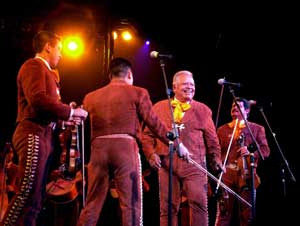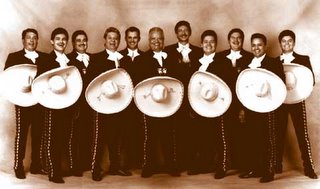When: Saturday, February 25 8:00 PM; I strongly recommend a preliminary talk by Mexican Consul General Sergio Aguilera at 7:15 in the Krannert Room of Clowes
Where: Butler University, Clowes Memorial Hall
Read first what Clowes Hall has to say about this event, than let me tell you what is wrong:
"A traditionalist and a visionary, Nati Cano has both mirrored and shaped the
history of mariachi music. He and Los Camperos, the group he founded and
directs, have been a driving force in the mariachi tradition in North America
for more than 40 years. His longtime association with Linda Ronstadt, backing
her up in live performances and on her milestone Canciones de Mi Padre album,
helped catapult mariachi music to unprecedented U. S. prominence."

Well, I can't really fault Clowes for this bit of boilerplate they have recycled. Everyone describes Cano as "a traditionalist and a visionary," copying the cliché from Cano's publicist. The problem I have is with the word "visionary." It implies an achievement comparable to Astor Piazzolla's integration of the down-and-dirty Argentinian tango with Western classical art music. (You'll get a sense of this tango transformation when Tanguísimo comes to town April 8.) Many young Mexican composers have attempted this sort of reworking for mariachi and other regional folk musics ... listen to the Kronos Quartet's important album Nuevo for a sense of these composers' ambitions as well as their limitations (the sense of irony that permeates some of the pieces slides into mockery).
"Visionary" could describe another kind of reworking, maybe similar to what "Los Tigres del Norte" did with the outdated traditional corrida memorializing lawbreakers and tragic losers, turning it into narco-corridas that sing of contemporary drug-smugglers and hired executioners.
Nati Cano went in neither of these directions. Instead, he preserved the traditional form of the mariachi, but assembled a band (actually several bands) capable of an almost unearthly level of precision and skill. By the standard of technical expertise (which is of course a very important standard) Los Comperos are indeed "the greatest."
Perhaps Cano's visionary status comes less from his stylistic innovation than from his institutional reworking of the world of mariachi performance. In the early 1960s he set up his band in a restaurant, La Fonda, where they continue to play three or four performances a night. This form of "dinner theatre" has been copied across the Southwest US and Mexico and allows mariachi players the steady income needed to practice their craft nearly full-time. Cano is also the driving force behind the "mariachi festivals" the stretch from Mexico as far afield as Maine.

Nati Cano himself won't be in Indianapolis (although I would not be surprised if Sergio Aguilera could pull off the trick of getting him here). But the version of Los Comperos that is Indianapolis will be excellent, and have pushed this beautiful and soul-stirring genre of music as far as it has ever gone.
You can compare this artistry of mariachi with other examples of folk or people's music that has been turned into art. We forget that Mozart was criticized in his time for making the music of the courts accessible to the folk: and when you see "The Marriage of Figaro" performed by Indianapolis Opera March 10 and 12, you will see the folk making fools o ftheir social betters. Sufi musicians perform on music of Muslim mysticism on March 16. And Tanguísimo on April 8 transforms the music of porteno docks and brothels into something quite different.
For information about tickets, go here.
To here samples of Los Comperos de Nati Cano's music go here and here. And go the performance!
Return to Navigating IndyBuzz
Return to Themes underpinning IndyBuzz
No comments:
Post a Comment